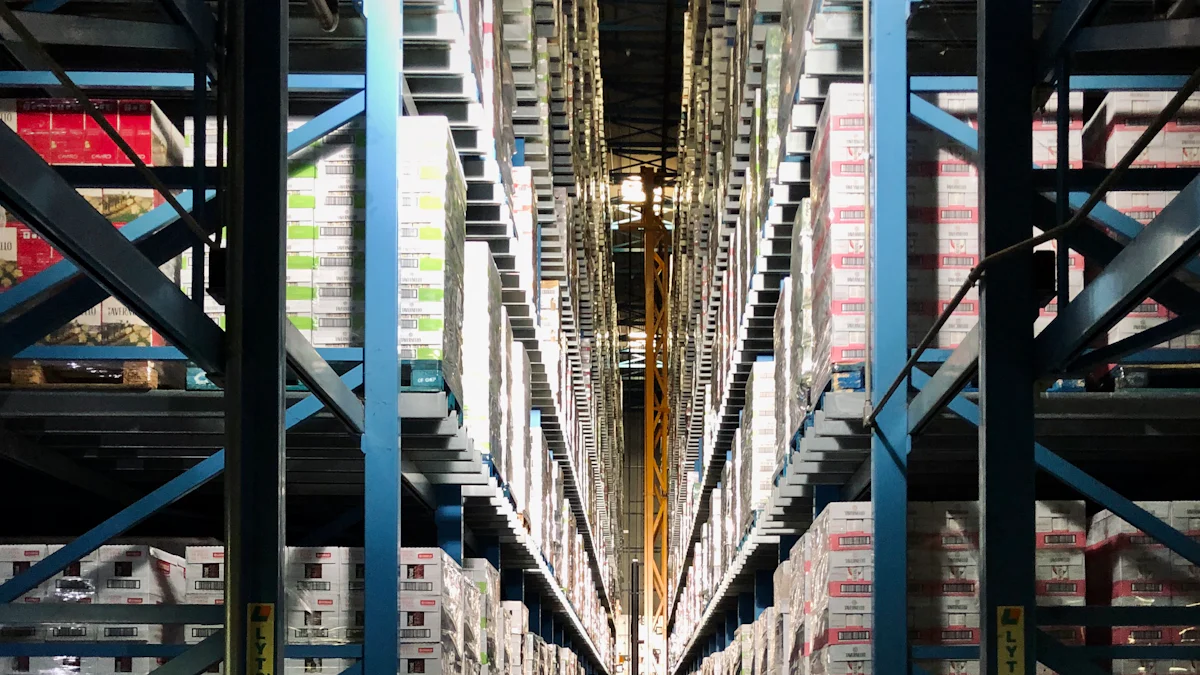The Future Supply Chain: A Path to Career Growth

The future supply chain is evolving rapidly, driven by technological advancements and innovative strategies. In modern business, the supply chain plays a pivotal role in ensuring seamless operations and efficient delivery of goods and services. The sector not only offers stability but also presents abundant career growth opportunities for individuals seeking a dynamic and rewarding profession.
Technological Advancements

Artificial Intelligence (AI) and Blockchain Technology are revolutionizing the future supply chain landscape. AI plays a crucial role in optimizing supply chain processes by predicting potential disruptions and enhancing operational efficiency. Through predictive analytics, AI algorithms can proactively identify issues before they escalate, ensuring seamless operations. Studies have shown that AI troubleshooting in the supply chain is instrumental in addressing challenges swiftly, minimizing downtime, and improving overall performance.
Automation and Robotics are reshaping the supply chain industry by streamlining operations and reducing costs. The integration of automation technologies has a significant impact on efficiency, enabling organizations to meet consumer demands effectively. By leveraging robotics, businesses can enhance productivity levels and achieve higher accuracy in tasks such as inventory management and order fulfillment. This transformative shift towards automation not only boosts operational efficiency but also drives cost reduction strategies across the supply chain network.
Blockchain Technology is another game-changer in the supply chain domain, offering enhanced transparency and security measures. By leveraging blockchain technology, organizations can ensure data integrity throughout the supply chain network, fostering trust among stakeholders. The immutable nature of blockchain enhances security against cyber threats, safeguarding sensitive information from unauthorized access. Studies have highlighted that the integration of blockchain and AI within supply chain management heralds a new era of heightened efficiency and transparency.
The future supply chain will witness a paradigm shift driven by technological advancements like AI, automation, robotics, and blockchain technology. These innovations are poised to redefine how businesses operate within the global marketplace, emphasizing agility, resilience, and sustainability at every touchpoint of the supply chain network.
Key Trends
Speed of New Product Introduction
Agility is a critical factor in the fast-paced environment of new product introduction. Companies that prioritize agility can swiftly adapt to market demands and stay ahead of the competition. By embracing agile methodologies, organizations can streamline their product development processes, reduce time-to-market, and enhance customer satisfaction. The ability to respond promptly to changing consumer preferences and market trends is essential for sustaining growth and profitability.
Market Adaptation is key to ensuring the success of new product introductions. Understanding market dynamics, consumer behavior, and competitive landscapes are vital for making informed decisions. Companies that proactively monitor market trends and consumer feedback can tailor their products to meet evolving demands effectively. By staying attuned to market shifts and customer preferences, businesses can position themselves as industry leaders and drive innovation within their respective sectors.
Resilience and Risk Management
Strategies for Resilience are crucial in mitigating supply chain disruptions and ensuring business continuity. Organizations that invest in robust resilience strategies can navigate unforeseen challenges with ease. By diversifying suppliers, implementing contingency plans, and fostering strong partnerships, companies can build a resilient supply chain network capable of withstanding various disruptions. Proactive risk management practices enable businesses to identify potential threats early on and implement preventive measures to minimize their impact.
Risk Mitigation Techniques play a pivotal role in safeguarding supply chain operations against uncertainties. Employing risk assessment tools, scenario planning, and real-time monitoring systems can help organizations detect vulnerabilities and address them promptly. By conducting regular risk assessments and developing mitigation strategies, companies can enhance their operational efficiency and protect their bottom line. Effective risk mitigation techniques empower businesses to anticipate potential risks proactively and implement measures to prevent or mitigate their adverse effects.
Sustainability and ESG Commitments
Environmental Impact considerations are becoming increasingly important in supply chain management. Companies are recognizing the significance of reducing carbon footprints, minimizing waste generation, and conserving natural resources. By adopting sustainable practices such as eco-friendly packaging, energy-efficient transportation modes, and responsible sourcing methods, organizations can contribute to environmental preservation while enhancing brand reputation. Prioritizing environmental sustainability not only benefits the planet but also resonates positively with environmentally conscious consumers.
Social Responsibility initiatives are integral to fostering ethical business practices within the supply chain ecosystem. Upholding fair labor standards, promoting diversity and inclusion, and supporting community welfare programs are essential components of social responsibility commitments. Companies that prioritize social responsibility demonstrate integrity, empathy, and accountability towards all stakeholders involved in their operations. By aligning business objectives with societal values, organizations can create a positive impact on society while building trust among customers and partners alike.
Career Opportunities

Growing Demand for Supply Chain Professionals
Supply chain management is witnessing a surge in demand for skilled professionals who can navigate the complexities of modern business operations. Organizations are actively seeking individuals with expertise in supply chain optimization, logistics management, and procurement strategies. The growing emphasis on efficiency, cost-effectiveness, and sustainability has propelled the need for supply chain professionals who can drive innovation and streamline processes effectively.
Key Skills in Demand:
Proficiency in data analysis and interpretation to optimize supply chain performance.
Strong communication skills to collaborate with cross-functional teams and external partners.
Knowledge of emerging technologies such as AI, blockchain, and automation to enhance operational efficiency.
Strategic thinking and problem-solving abilities to address challenges proactively.
Adaptability to dynamic market conditions and evolving industry trends.
Job Market Trends:
Specialized Roles: Companies are creating specialized roles such as Supply Chain Analysts, Logistics Coordinators, and Procurement Specialists to meet specific business needs.
Remote Work Opportunities: The rise of digital platforms has enabled remote work options for supply chain professionals, offering flexibility and work-life balance.
Global Expansion: With businesses expanding globally, there is a growing demand for supply chain professionals with international trade expertise.
Sustainability Focus: Companies are integrating sustainability practices into their supply chains, leading to an increased demand for professionals with environmental stewardship knowledge.
Career Paths in Supply Chain Management
Embarking on a career in supply chain management opens doors to diverse opportunities for professional growth and advancement. Individuals entering the field have the chance to explore various career paths tailored to their interests and skill sets. From entry-level positions that provide foundational knowledge to advanced roles that offer strategic leadership opportunities, the supply chain sector offers a clear trajectory for career development.
Entry-Level Positions:
Procurement Assistant: Assisting in sourcing materials, vendor negotiations, and contract management.
Inventory Control Clerk: Managing inventory levels, conducting audits, and optimizing stock replenishment processes.
Logistics Coordinator: Coordinating transportation activities, tracking shipments, and ensuring timely deliveries.
Advanced Roles:
Supply Chain Manager: Overseeing end-to-end supply chain operations, implementing strategic initiatives, and optimizing processes for efficiency.
Logistics Director: Leading logistics functions across multiple regions or countries, driving cost savings initiatives while maintaining service quality standards.
Chief Procurement Officer (CPO): Setting procurement strategies at an organizational level, managing supplier relationships, and ensuring compliance with regulatory requirements.
Salary and Advancement Potential
Supply chain careers offer competitive salaries along with ample opportunities for professional growth within the industry. As organizations recognize the critical role of supply chain management in achieving operational excellence, they are willing to invest in top talent by offering attractive compensation packages and advancement prospects.
Competitive Salaries:
Entry-level positions typically start at $45k-$60k annually depending on location and company size.
Mid-career professionals such as Supply Chain Managers earn an average salary of $80k-$120k annually based on experience and industry sector.
Executive roles like Chief Supply Chain Officer (CSCO) command six-figure salaries ranging from $150k-$250k annually plus bonuses based on performance metrics.
Opportunities for Growth:
Professional Development: Continuous learning opportunities through certifications like Certified Supply Chain Professional (CSCP) or Advanced Planning & Scheduling (APICS).
Cross-functional Exposure: Moving across different departments within an organization to gain holistic business perspectives beyond traditional supply chain functions.
Leadership Roles: Progressing into senior leadership positions where strategic decision-making capabilities are crucial for driving organizational success.
Professionals in the supply chain management sector are at a pivotal juncture as they navigate the evolving landscape shaped by data analytics, AI, blockchain, sustainability, and digitalization. The demand for individuals proficient in harnessing big data to optimize operations and forecast trends is on the rise. As global supply chains continue to transform through technological advancements, professionals must efficiently manage complexities within their data landscape to make informed decisions. With a deep understanding of logistics, inventory management, and procurement processes, supply chain managers play a critical role in driving sustainability initiatives and addressing new challenges daily. Young professionals entering this field have the opportunity to make a tangible impact on outcomes while contributing to a more sustainable future.
See Also
Exploring the Future of Supply Chain: AI Implementation Tips
